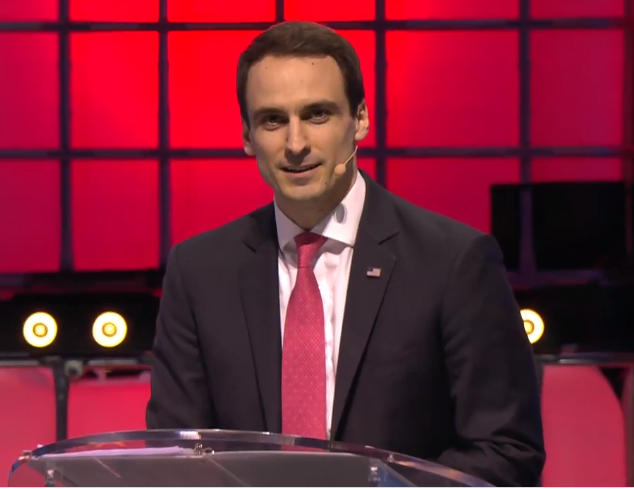Kratsios: U.S., Allies Must Confront Chinese Tech
The smarter way to stay on top of the multichannel video marketplace. Sign up below.
You are now subscribed
Your newsletter sign-up was successful
U.S. Chief Technology Officer Michael Kratsios, the top Trump Administration techpolicy adviser, took direct aim at China and Chinese telecom Huawei in a speech to Web Summit 2019 audience in Lisbon Thursday (Nov. 7).
He left no doubt that both were a threat not only to the security of 5G networks but the free market-driven values of openness and innovation.

Kratsios sounded as if he were channeling Consumer Technology Association President Gary Shapiro, who at a 5G conference earlier in the week said the U.S. needed to win the race to 5G because it was not just a tech race, but one to establish basic values of freedom and innovation.
Related: Pai Circulates Huawei, ZTE Tech Ban
"Tech leadership has never been more of an imperative," Kratsios said, making a similar argument.
He said that while the U.S. and its allies work to together to develop tech--5G, AI--for the good of mankind, they also need to defend against a government that was subverting technology to undermine those values.
He said China was maintaining its authoritarian regime by twisting technology to favor censorship over free expression and control of its citizens over their empowerment.
The smarter way to stay on top of the multichannel video marketplace. Sign up below.
China violates its citizens privacy by monitoring and blocking their communications, using it to control and imprison dissidents and disregard human dignity, and it is extending those values abroad, he said, adding that in no case is that more apparent than with Huawei, the Chinese 5G hardware supplier.
He pointed out that Chinese law compels companies to cooperate no matter where they operate, citing news reports that after Huawei installed tech at the African Union, its system was hacked and data transferred nightly to Beijing for five years.
Despite the obvious threat, he warned, countries contine to consider "opening their arms" to letting Chinese companies build critical infrastructure like 5G and AI.
Doing so risks a repeat of what happened when China was allowed into the World Trade Organization back in 2001 with the expectation that opening it up to them would result in China liberalizing both economic and political policies," Kratsios said. Instead, China stole intellectual property and now forces companies to hand over tech to access their market, as well as access to data on any server resident in China.
Related: Trump, Tech Companies Agree Huawei Needs Restrictions
The world is at a similar crossroads, he warned, and made it clear "open arms" was not an acceptable tech policy option.
He said the U.S. and its allies must combat technological oppression and make sure that new tech is used to uplift and empower. He said that given the pace of technology, if that free world does not act now, not only will China undermine its own citizens, but the rest of the world's as well.
He said repressive march can be turned back, but only "if we make the right choices now and ratify our words with actions."
Contributing editor John Eggerton has been an editor and/or writer on media regulation, legislation and policy for over four decades, including covering the FCC, FTC, Congress, the major media trade associations, and the federal courts. In addition to Multichannel News and Broadcasting + Cable, his work has appeared in Radio World, TV Technology, TV Fax, This Week in Consumer Electronics, Variety and the Encyclopedia Britannica.

